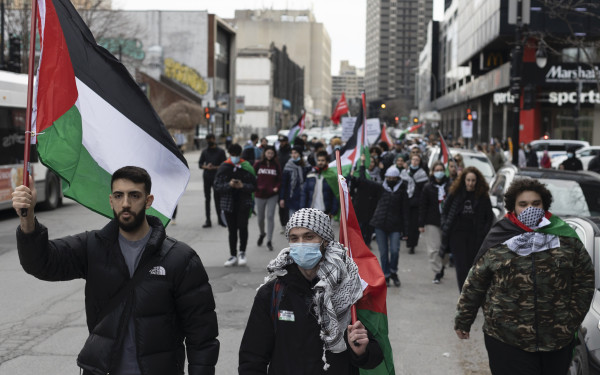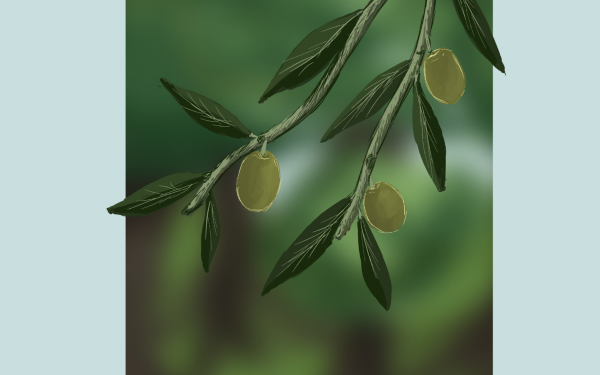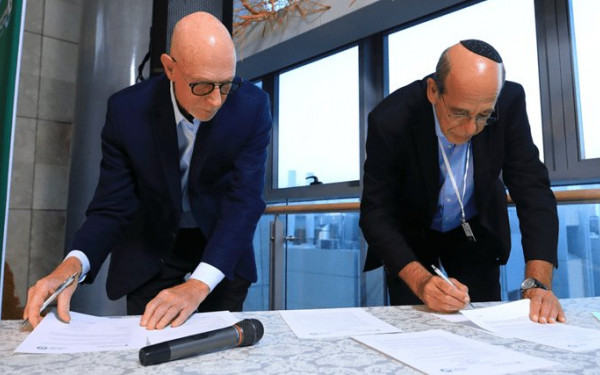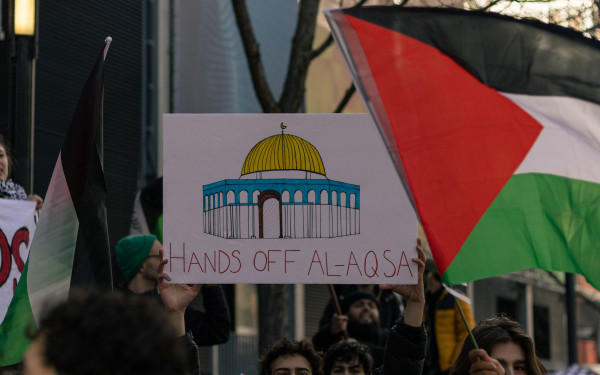Sharing a meal across barrier lines
Palestinian food’s vitality, prominence, and growing ubiquity
When Dana was six, her elementary school in Montreal hosted a cultural food-sharing day. When she eagerly brought a bowl of hummus to the event, an Israeli student in the same grade came up to her, grabbed it from her, and told her that it was actually his.
To this day, Dana said the memory is an indelible moment for her: it was when she discovered she was Palestinian.
She remembers the confusion she felt, seeing her teacher ignore the situation, and the disappointment and dismay on her dad’s face when she told him about it.
“At that moment I understood what it means to be Palestinian; it means having everything taken away from you,” she said.
Dana, whose last name The Link has agreed to omit, is now an engineering student at Concordia. She also works as vice president of fundraising and sponsorship for a youth organization called Darna Montreal—which began as an informal network connecting Palestinians across the city, but which is now a stable organization that regularly holds cultural events.
Through it, Dana seeks to repair childhood damage with community. Darna Montreal gives her and other Palestinian Montrealers an apolitical space to celebrate their culture.
“There are so many political things that come with being Palestinian, so we wanted a group that was separate from it. Even though just being Palestinian is political—the title ‘Palestinian’ itself is political,” she said. “Being around my Darna friends makes me feel at home.”
She went on to say that, in Canada, she’s always cautious of how much she shares about her Palestinian heritage with non-Palestinian strangers. When speaking about her Palestinian culture, she often feels like she has to brush it off, “like rice from a table.” Often, they react to learning that she’s Palestinian with pity, defensiveness, or even outright attacks.
“I don’t want to experience any of that. I want to feel human—thats why Darna Montreal is so important to me. Being around them is not being Palestinian. It's just being a human, because we don’t have to justify anything to each other,” she said. “Through our regular cultural events, we’ve become a little family.”
At the centre of these events, she said, is Palestinian food.
To Dana, food is the greatest harmonizer. In the Arab region, it connects people from all different religions and classes to one another—and as someone in the diaspora, it connects her to the homeland.
One dish that holds an enriching importance to her is mujadarra, which is popular in both rich and poor communities. It's a classic dish featuring rice, onions, and lentils.
The lentils and rice can be cooked together in the same pot and then layered over later with caramelized onions. It can be served with yogurt as a side option. Lentils, which are low in calories and rich in iron and folate, are an excellent source of protein with many health benefits.
Many Palestinian dishes are vegetarian, Dana said, not because of any religious or cultural reasons but because the land is so rich. "We don’t need to eat much meat to get iron or protein because we have what grows from the land," she said.
“Being around them is not being Palestinian. It’s just being a human, because we don’t have to justify anything to each other. […] [W]e’ve become a little family,” – Dana
Another type of dish that holds significance to her is Ma7shi: a versatile dish that can take the form of anything rolled up with rice stuffed inside of it—meat can be included in it as well. One example of this is the savoury Diwali—which are rolled up grape leaves containing rice, and possibly onions, potatoes and meat, all stuffed inside. Another example is Kusa—Dana’s favorite.
Kusa is stuffed zucchini. It can take its form in a range of different variations, and can be stuffed with a variety of ingredients—from different sorts of meats to different sorts of vegetables. A variation includes Kusa Bel Laban, where the stuffed zucchini is submerged in a bowl of creamy, white, thick yoghurt sauce. The yoghurt sauce can be mixed together with a variation of fresh herbs and spices—including parsley, mint, cilantro and dill—to accentuate its flavour.
Another popular dish is Mukashan, a mouth-watering dish where taboon bread is covered with Sumac—a tangy, acidic and fragrant spice made from the ground berries of the wild Sumac flower—and topped with onions and chicken. Nuts can also be added onto the meal.
Muqlaba — another staple dish which literally translates into “upside-down”, from Arabic to English. This fun dish is made by placing chicken, vegetables, and cooked rice all layered on top of each other, in that order, in a pot. It is then boiled for 30 minutes, and then inverted onto a plate, so that the ingredients are all solidified together in a cake formation, with the chicken at the top and the rice at the bottom. It is served this way.
Most of these are found all across the Levant—a large geographical portion of the Middle East, including countries such as Iraq, Jordan, Palestine, Syria, and Lebanon.
Part of the beauty of these dishes, she said, is that they are prepared and cooked differently in each region.
Nadia Irshaid Gilbert, a Palestinian chef based in New York City, similarly finds beauty in the variation of the same meals that exist across diverse Levant communities.
Gilbert specifically mentions the staple za'atar, which is a prepared condiment. It comes from the za'atar plant and tastes different wherever you go in the Levant, as its taste depends both on how it's grown and how it's harvested. Gilbert gets theirs from Jenin, where their family is from.
Growing up in the diaspora, their mother connected them to their identity. In Florida, they had no Palestinians around them, but their mum made sure the connection remained intact by teaching them Arabic and about their faith.
Gilbert describes being a very picky eater as a child, and they refused to eat certain American dishes. Their mother’s and relatives’ cooking fed them more than anything else. Part of this explains the reason for their journey in becoming a chef. After they left their family’s home for college, they lost access to their mother's Palestinian cooking, so they had to learn how to cook it themselves.
Gilbert eventually created their own online cooking show called Sahtein!, where they showcase different Palestinian dishes to their audience. The aim of the show is to dismantle the idea that Palestinian dishes are difficult to cook and to empower others to learn how to do it for themselves, Gilbert said.
“I've been astonished by the attention the show has received,” they said. “There’s clearly a large group of people who are interested in these dishes.”
To Gilbert, the show has not only been collaborative, through teaching recipes to a receptive audience, but also a personal and meditative experience.
“I used to feel very disconnected. When I cook, I focus on nourishing myself and showing myself love. In this way, it really helped me connect to myself more fully,” they said. “There's so much power in what we eat. What we eat literally becomes us. I find it sad that people find cooking a chore or just something you have to do in between all the things going on in your day. The food we eat is more important than we realize.”
The food that carries the most significance to her is mlokieh—in English, it's called jute marrow. It's a green that is minced and is served with rice and roasted chicken. The dish can be very garlicky. Gilbert describes the plant that mlokeih comes from—also named mlokeih—as “one of the most deeply nourishing plants on earth.”
“When I eat it, I feel safe, I feel home,” they said.
The consumption of Palestinian food involves deep presence and sharing for both Dana and Gilbert. Dana mentions that a common practice her family partakes in is eating from the same plate. One of the rules involved in this is that you have to eat from what's in front of you—regardless of whether or not you like it.
“So if you don’t like a piece of meat you’re given, you’re not allowed to grab around to get someone else’s meat. “ She said. “By looking in front of you, it forces you to be present.”
Dana mentions that before a meal, her family says Bismillah, which is Arabic for “in the name of God’ and then after eating, they say Alhamdulillah, which is a thank you to God. This comes from Islamic tradition. It is also important to eat the entirety of everything, which is based in both Palestinian and Islamic tradition, she said.
Amongst these enriching facets of the cuisine, the disturbing politics unfortunately exist in the background. The colonial violence—which is an enduring disruption—has affected the food culture. Israel’s illegal occupation of the West Bank has severely harmed Palestine’s agricultural sector, according to Al Jazeera. Due to checkpoints, farmers are deprived of access to fertile land, water sources, and markets.
There is an exploitation taking place, said Dana. In Palestine, the checkpoints act as barriers that limit the ability of Palestinians to share recipes.
There is also an external issue, where the profits from food exports barely make it into the hands of the people who actually farmed, harvested, or packaged the food, said Dana. This is disastrous not only for the individuals working with the food but negatively affects Palestine’s economy, the well-being of the people, and the culture’s legacy on a collective level.
“Food is one of the most important parts of our heritage—if it's no longer ours, we’re losing so much,” she said.
“I live in the diaspora so I can’t speak for those living in Palestine,” Gilbert said. “But there are so many Palestinian farmers who have to deal with settler violence, with people destroying their crops, or stopping them from being able to get to their farmlands.”
Dana also thinks there is an appropriation taking place in Western countries, such as Canada, where food companies make profits off of traditional Palestinian foods—such as hummus—without crediting the country it originates from.
According to an article in The New York Times, Palestinian food also tends to be oversimplified with the larger term “Middle Eastern food” or “Mediterranean food.” Gilbert said that this is homogenizing as there are so many nuances in Palestinian food.
Even though Gilbert was initially angered by this and by other factors of the exploitation, they now choose to alchemize their rage into joy for Palestinian cuisine. Gilbert said the Israeli occupation and the oversimplification of the “Middle Eastern food” label definitely contribute to erasure. They spend most of their time, however, focusing on the act of sharing information about the food and on ways to amplify the culture through it.
People are genuinely interested in learning about the culture, Gilbert said, and as time has passed, people have grown less and less ignorant about it.
“It's a really beautiful thing to see people open their hearts and learn more about the soul of our food,” they said.
Dana echoes this, adding that the aspect of her Palestinian identity that she’s most proud of—besides the strength of community—is resilience.
“We’re able to turn any situation, despite how negative it is, into something liveable, humane, and artistic,” she said.
This resilience is similarly seen through the food and its culture.
“We make things out of literally anything. We will cook and make good meals out of anything,” she said.
“Despite all of the barriers, the food culture continues to expand and bring more people in,” said Gilbert.
This article originally appeared in The Food Issue, published November 3, 2020.






